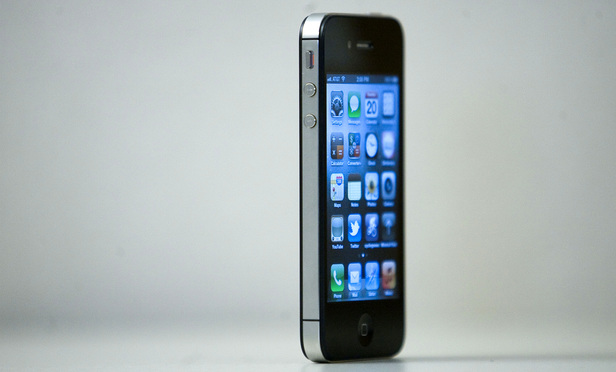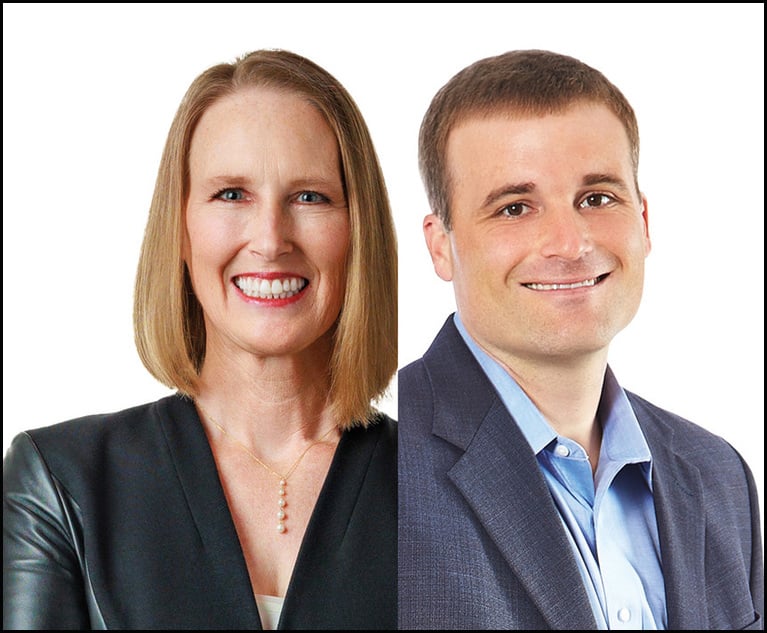Apple Faces Certified Class in Suit Over FaceTime Glitch in Older iPhones
U.S. District Judge Lucy Koh certified a class of California iPhone 4 and iPhone 4S owners who claim their phones lost value when the phone's video-calling feature stopped working with older versions of the phone's software. She, however, declined to certify a nationwide class.
September 19, 2018 at 04:43 PM
3 minute read
 Apple iPhone 4s. Photo: Diego M. Radzinschi/ALM
Apple iPhone 4s. Photo: Diego M. Radzinschi/ALM
A federal judge in San Jose has certified a class of iPhone 4 and iPhone 4S owners in California who, because of a software glitch, lost the ability to use the FaceTime feature to make video calls.
The lawsuit was filed in the wake of what U.S. District Judge Lucy Koh of the Northern District of California, who is overseeing the case, has termed the “FaceTime Break” after FaceTime stopped working on iPhone 4 and iPhone 4S devices that used iOS 6 or earlier operating systems in April 2014. Plaintiffs claim they were left with a catch 22 of either upgrading their operating systems with software their phones weren't equipped to run efficiently or to keep their existing software and lose the use of FaceTime.
Koh on Tuesday turned back arguments from Apple's lawyers at Kirkland & Ellis, who claimed the lawsuit was inappropriate for class treatment since owners of the old phones lost access to FaceTime for different amounts of time depending on how long they waited to upgrade their devices' operating system, and the plaintiffs varied in how much they actually used FaceTime.
But those arguments missed the thrust of the plaintiffs' case, Koh wrote.
“Plaintiffs' theory of the case is that Apple is liable because the FaceTime Break reduced the monetary value of class members' iPhones. Determining precisely how often a class member … used FaceTime is irrelevant to that analysis,” Koh wrote.
Apple representatives didn't immediately respond to a request for comment Wednesday.
The lawsuit came in the wake of an intellectual property setback for Apple. In November 2012, a federal jury in the Eastern District of Texas found one of the methods Apple used to connect FaceTime calls—using a so-called “peer-to-peer” connection—infringed patents owned by VirnetX Inc. After the verdict, Apple began connecting all FaceTime calls via a separate method using a third-party server to relay calls from device to device. But paying for the new method quickly ran up millions in fees for server space, according to internal Apple emails.
Apple hoped to cut those costs with the introduction of iOS7, but because of reported performance issues, users of old phones didn't upgrade new software en masse until the FaceTime Break.
The plaintiffs' damages expert claims the break caused prices of used iPhone 4 and iPhone 4S devices to fall by nearly 13 percent.
Plaintiffs, however, didn't get everything they asked for in Tuesday's order. Koh declined to certify a nationwide class to pursue claims of trespass to chattels under California law and claims under the state's Unfair Competition Law. Koh found that California choice of law rules precluded applying California law to the proposed nationwide class. She also denied the plaintiffs' request to certify a class to pursue injunctive relief finding that they hadn't spelled out just what relief they were seeking.
Also on Tuesday, Koh appointed Jill M. Manning of Steyer Lowenthal Boodrookas Alvarez & Smith, Daniel L. Warshaw of Pearson, Simon & Warshaw, John Austin Curry of Caldwell Cassady & Curry, and David F.E. Tejtel of Friedman Oster & Tejtel as class counsel.
Manning didn't immediately respond to a message seeking comment Wednesday.
Read the judge's ruling below:
Read more:
Apple Can't Knock Suit Over FaceTime Glitch on Older iPhones
This content has been archived. It is available through our partners, LexisNexis® and Bloomberg Law.
To view this content, please continue to their sites.
Not a Lexis Subscriber?
Subscribe Now
Not a Bloomberg Law Subscriber?
Subscribe Now
NOT FOR REPRINT
© 2025 ALM Global, LLC, All Rights Reserved. Request academic re-use from www.copyright.com. All other uses, submit a request to [email protected]. For more information visit Asset & Logo Licensing.
You Might Like
View All


TikTok Hit With California Class Action for Allegedly Mining Children's Data Without Parental Consent

Khan Defends FTC Tenure, Does Not Address Post-Inauguration Plans
Trending Stories
- 1Many LA County Law Firms Remain Open, Mobilize to Support Affected Employees Amid Historic Firestorm
- 2Stevens & Lee Names New Delaware Shareholder
- 3U.S. Supreme Court Denies Trump Effort to Halt Sentencing
- 4From CLO to President: Kevin Boon Takes the Helm at Mysten Labs
- 5How Law Schools Fared on California's July 2024 Bar Exam
Who Got The Work
Michael G. Bongiorno, Andrew Scott Dulberg and Elizabeth E. Driscoll from Wilmer Cutler Pickering Hale and Dorr have stepped in to represent Symbotic Inc., an A.I.-enabled technology platform that focuses on increasing supply chain efficiency, and other defendants in a pending shareholder derivative lawsuit. The case, filed Oct. 2 in Massachusetts District Court by the Brown Law Firm on behalf of Stephen Austen, accuses certain officers and directors of misleading investors in regard to Symbotic's potential for margin growth by failing to disclose that the company was not equipped to timely deploy its systems or manage expenses through project delays. The case, assigned to U.S. District Judge Nathaniel M. Gorton, is 1:24-cv-12522, Austen v. Cohen et al.
Who Got The Work
Edmund Polubinski and Marie Killmond of Davis Polk & Wardwell have entered appearances for data platform software development company MongoDB and other defendants in a pending shareholder derivative lawsuit. The action, filed Oct. 7 in New York Southern District Court by the Brown Law Firm, accuses the company's directors and/or officers of falsely expressing confidence in the company’s restructuring of its sales incentive plan and downplaying the severity of decreases in its upfront commitments. The case is 1:24-cv-07594, Roy v. Ittycheria et al.
Who Got The Work
Amy O. Bruchs and Kurt F. Ellison of Michael Best & Friedrich have entered appearances for Epic Systems Corp. in a pending employment discrimination lawsuit. The suit was filed Sept. 7 in Wisconsin Western District Court by Levine Eisberner LLC and Siri & Glimstad on behalf of a project manager who claims that he was wrongfully terminated after applying for a religious exemption to the defendant's COVID-19 vaccine mandate. The case, assigned to U.S. Magistrate Judge Anita Marie Boor, is 3:24-cv-00630, Secker, Nathan v. Epic Systems Corporation.
Who Got The Work
David X. Sullivan, Thomas J. Finn and Gregory A. Hall from McCarter & English have entered appearances for Sunrun Installation Services in a pending civil rights lawsuit. The complaint was filed Sept. 4 in Connecticut District Court by attorney Robert M. Berke on behalf of former employee George Edward Steins, who was arrested and charged with employing an unregistered home improvement salesperson. The complaint alleges that had Sunrun informed the Connecticut Department of Consumer Protection that the plaintiff's employment had ended in 2017 and that he no longer held Sunrun's home improvement contractor license, he would not have been hit with charges, which were dismissed in May 2024. The case, assigned to U.S. District Judge Jeffrey A. Meyer, is 3:24-cv-01423, Steins v. Sunrun, Inc. et al.
Who Got The Work
Greenberg Traurig shareholder Joshua L. Raskin has entered an appearance for boohoo.com UK Ltd. in a pending patent infringement lawsuit. The suit, filed Sept. 3 in Texas Eastern District Court by Rozier Hardt McDonough on behalf of Alto Dynamics, asserts five patents related to an online shopping platform. The case, assigned to U.S. District Judge Rodney Gilstrap, is 2:24-cv-00719, Alto Dynamics, LLC v. boohoo.com UK Limited.
Featured Firms
Law Offices of Gary Martin Hays & Associates, P.C.
(470) 294-1674
Law Offices of Mark E. Salomone
(857) 444-6468
Smith & Hassler
(713) 739-1250






